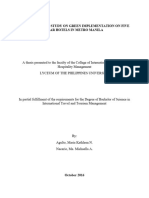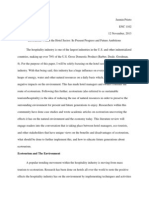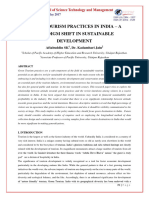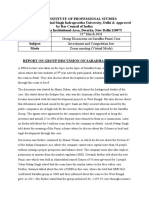0% found this document useful (0 votes)
135 views5 pagesGreen Tourism Practices in Alabang Hotels
This document discusses green tourism practices in the hotel industry and their impact on customer satisfaction. It begins by defining green tourism as tourism that balances economic growth with environmental and social responsibility. It then discusses how green hotels conserve resources like water and electricity to lessen their environmental impact. While going green provides economic benefits, it also requires substantial upfront costs. The document also examines customers' growing preference for sustainable practices and hotels' motivation to go green. Finally, it explores how greening the hotel sector in the Philippines presents opportunities to maintain tourism growth while providing healthier environments for guests.
Uploaded by
Macaraeg NicoleCopyright
© © All Rights Reserved
We take content rights seriously. If you suspect this is your content, claim it here.
Available Formats
Download as DOCX, PDF, TXT or read online on Scribd
0% found this document useful (0 votes)
135 views5 pagesGreen Tourism Practices in Alabang Hotels
This document discusses green tourism practices in the hotel industry and their impact on customer satisfaction. It begins by defining green tourism as tourism that balances economic growth with environmental and social responsibility. It then discusses how green hotels conserve resources like water and electricity to lessen their environmental impact. While going green provides economic benefits, it also requires substantial upfront costs. The document also examines customers' growing preference for sustainable practices and hotels' motivation to go green. Finally, it explores how greening the hotel sector in the Philippines presents opportunities to maintain tourism growth while providing healthier environments for guests.
Uploaded by
Macaraeg NicoleCopyright
© © All Rights Reserved
We take content rights seriously. If you suspect this is your content, claim it here.
Available Formats
Download as DOCX, PDF, TXT or read online on Scribd
/ 5
































































































